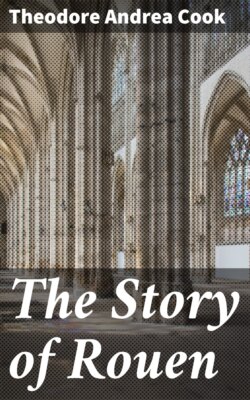Читать книгу The Story of Rouen - Theodore Andrea Cook - Страница 10
На сайте Литреса книга снята с продажи.
Оглавление"It is for this we travel, to surprise its subtlety; and where it is a strong and dominant angel, that place, seen once, abides entire in the memory with all its own accidents, its habits, its breath, its name. It is recalled all a lifetime, having been perceived a week, and is not scattered but abides, one living body of remembrance. The untravelled spirit of place—not to be pursued, for it never flies, but always to be discovered, never absent, without variation—lurks in the byways and rules over the towers, indestructible, an indescribable unity. It awaits us always in its ancient and eager freshness. It is sweet and nimble within its immemorial boundaries, but it never crosses them. Long white roads outside have mere suggestions of it and prophecies; they give promise, not of its coming, for it abides, but of a new and singular and unforseen goal for our present pilgrimage, and of an intimacy to be made."
How many a traveller moves from place to place, not realising anything beyond the transportation of his body! Yet in every town there is this fresh acquaintance, this lifelong friendship, that shall last while his own memory lasts, that is as fresh for him as for a thousand before him, and for tens of thousands after. When the bells of an unknown city have given me their first greeting, my first acknowledgment of that compelling invitation is to see those buildings in the town that can become alive again beneath their echoes. Of such churches, of such civic buildings, of private houses, of monuments by unknown hands for unknown owners, Rouen is full in almost all her streets.
"Là dans le passé tu peux vivre
Chaque monument est un livre
Chaque pierre un souvenir."
The history of the Middle Ages is written upon magnificent and enduring volumes, and a great responsibility is laid on those who would deface the writing on the wall. Their virtues and vices, their jests and indecencies, their follies and their fears, are all writ large upon the pages of a book that was ever open to every passer-by, and that remains for us to read. It is no rhetorical exaggeration, that "Ceci tuera cela" of Victor Hugo. Our smaller doings are recorded in the perishable print of fading paper, and we have no care to stamp what little we have left of character upon our buildings. No one, at least it may be fervently hoped, will try in the future to reconstruct the ideals or the life of the Victorian Era from its architecture. Yet we are the heirs of all that is noblest in that greatest of all arts; and if you would test that, you need only look at any mediæval French Cathedral with a seeing eye. You will find no meaningless mass of bricks and mortar, but the speaking record of the age that built them. "The stone shall cry out of the wall, and the beam out of the timber shall answer it."
